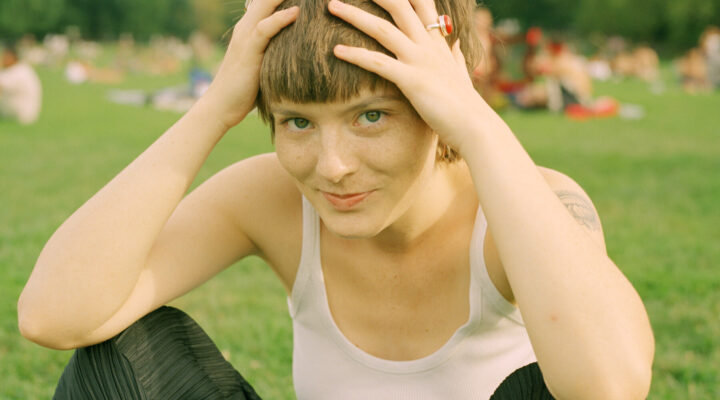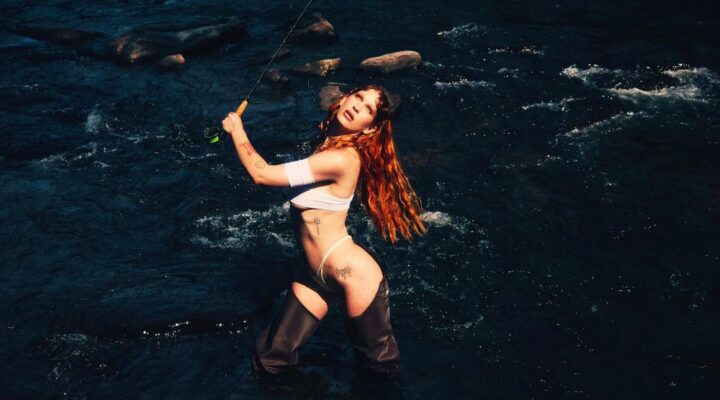Tent Academy Awards | Lyuba Matyunina
Interview by Floor Kortman, video stills by Lyuba Matyunina
The Tent Academy Awards showcases the best Dutch and Finnish video and film art among the graduates of 2014. We talked to Lyubov Matyunina, winner of the audience award, about her video ‘Who can be Happy and Free?’. The video is based on a poem by Nikolay Nekrasov. Matyunina traveled through her native country, asking people the same question Nekrasov wrote about.
‘I wanted to go on the same roads in search of happiness as those thar Nekrasov wrote about, but in the context of contemporary Russia’
Who are you?
I am Lyuba Matyunina, a visual artist from Kaliningrad, a Russian island in the middle of Europe. I got my first master in Journalism after which I moved to Amsterdam, to study at the Gerrit Rietveld Academy, where I just graduated this month.
I am also co-founder of UKROP (www.ukrop.nl) a platform for moving art run by and for emerging artists who focus on international collaboration, centred around organizing expositions abroad.
How are you?
I am feeling happy and free, haha! During the graduation show a lot of people came up to me and said that they enjoyed watching my film and I got nominated to GRA award and TENT award. It was a cool time.
I read you studied VAV, but that doesn’t automatically mean you make videos, especially this kind of documentary/art video. So, how did you start making video art, and what do you like about it?
I worked as a journalist for 7 years, mostly for radio and newspapers. When I first came to Rietveld I loved to paint and make installations, but somehow video became big part of my work. I like to play with a documentary style, but I see my video works as a part of an installation. For my graduation project I made a two-sided installation, on one side you can see a “Wishmaster Carpet” and on the other the film “Who can be happy and free?”
What I love about video is that you can make things come alive. In this video, I implemented fictional characters that became a part of the film reality and then mixed it with “real reality” – in the end it became a concept of reality and how many realities exist in a possibility of a non-existing reality. Creating this kind of absurdity for the viewer is a big part of my process.
Can you tell me something about your video ‘Who can be happy and free?’ How did you come about this subject and what was it about the poem by Nikolay Nekrasov that struck you?
First of all I wanted to make film about Russia, something real and something good. A lot of friends of mine live there, and they are very happy. Maybe they don’t like political situation or have other troubles but in the end they are living there and don’t want to move away. I tried to understand what makes people feel happy and that’s how the poem came to me. The poem “Who can be happy and free in Russia?” is from the 19th century but is still actual.
Nekrasov started writing this book straight after the serfdom abolition in 1863 and worked on it for 14 years. The poem tells the story of seven free men, and their travels on a long journey all over Russia, trying to answer the question: who is happy and free? After reading it again I felt that I needed to do a remake of it. I wanted to go on the same roads in search of happiness as those thar Nekrasov wrote about, but in the context of contemporary Russia.
Can you give some examples of answers that you found to the question Who can be happy and free?
I will say as Slava did in the film: ”There are lot of different kinds of happiness, it is all very personal, not universal.”
What is the role of the seven masked heroes in the video and in the poem?
Actually we don’t know anything about them, only names and their main goal – find out what is happiness and freedom is. For me they represent the eternal quest for the answers to the eternal questions.
The music plays a big part in the video and the storytelling, as does the graphic design of it, what are your considerations here? How do these collaborations arise?
They are all my friends! First one of my friends made the sound, then I chose the best parts from the poem and we recorded some hip hop at the apartment of great friend of mine, who also helped me with filming in Kaliningrad. I did the graphic design with some help. I had actually used the folk motives in a film before. I used them as a textile print for a costume in another project.
What I can say I have amazing and talented friends, and I was happy to collaborate with everybody.
Now that you’re graduating, do you have any other plans for the future, anything you’re working on? Besides the TAA, of course…
I feel that now is the time to show my work to the world and I am planning to apply to the different festivals. I think in August I will slowly start working on my new project, which will be about Holland, actually. Also, with UKROP we’re planning to do some shows in Amsterdam and maybe in Russia!
In general I want so solve all visa problems and become a cosmopolite, haha! Travel around the world, do residencies and enjoy the process of creation.
The video ‘Who can be happy and free?’ by Lyuba Matyunina is part of the exhibition of Tent Academy Awards and will be on view at TENT until 17 August.



